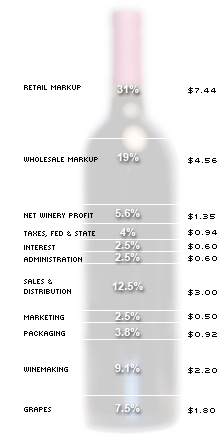 New French oak, small production, dense California fruit, and an attentive, niche-savvy negociant. Is that enough to make great wine? What if we throw in some bandwidth?
New French oak, small production, dense California fruit, and an attentive, niche-savvy negociant. Is that enough to make great wine? What if we throw in some bandwidth?
As consumers grow even more restless of their local liquor stores and opt-in to more mailing lists, wine clubs, and virtual megamarts, one company has decided to market its juice strictly on the merits of being sold online. And while Cameron Hughes Wine seems proud that its 500-case barbera won’t (can’t?) be sold in any physical stores, I can’t help but ask, “Why not?”
Hughes isn’t the only one to limit sales this way. Perhaps with a distaste for all the red tape involved with actually getting a wine from barrel to consumer, wineries have long offered to sell their bottles online. Most notoriously, perhaps, is Heidi Barrett’s decadent Screaming Eagle cabernet, available exclusively to the stealth mailing list’s subscribers.
The Cameron Hughes Wine project, however, attempts to introduce a wine solely by way of internet, encouraging people to snatch up something they’ve never even heard of in lots of six or more. For whatever reason, I’m excited, but only in the way I get excited to go on the last rickety roller coaster before the carnival closes for the summer. I only want to do it because I might not get to again, but sometimes it takes my breath away.
Fortunately, for customers, Hughes himself is involved closely enough to answer questions and solve any problems that might arise. Rubbed against those of top growers from across California, his shoulders can more than carry the weight.
But what does this push toward internet sales–evidenced by recent years of court battle on shipping and retail rights–mean for the consumer? A candid graphic on the Hughes site reveals just how much we’ll save by cutting out the middle man, which has now grown into an army of seedy croupiers.
For one, what do we do with corked bottles? A Macquarie Wine Show study found more than 8% of all wines sealed with cork closures to be infected with TCA. One whiff of even a day-old bottle ripe with that moldy funk, and any good wine shop manager would open up the cash register for a refund. What if that manager is hundreds of miles away or doesn’t exist at all?
Add to that the spoilage liability of wines shocked from shipment, cooked by heat, or infected with volatile acidity and wringed like sweaty towels into vinegar.
There’s little recourse for us. But, there’s even less for the winery, which risks either being ripped off by unwholesome or inexperienced customers, or losing its reputation altogether.
Making good wine is hard enough as it is. Buying it should be easy.